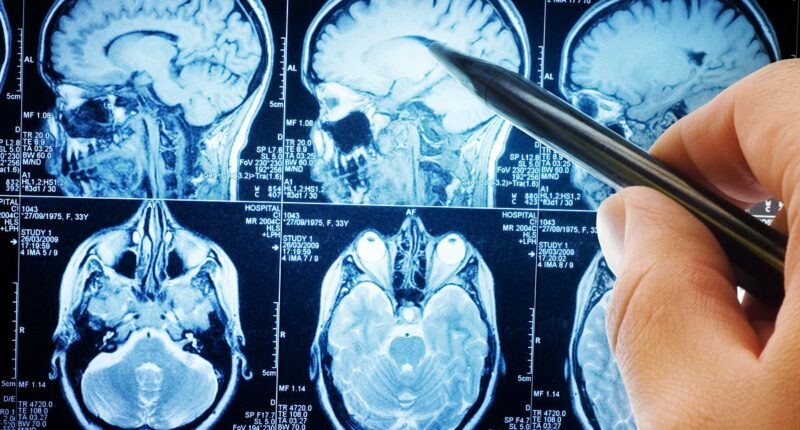Share this @internewscast.com
According to recent research, excessive alcohol consumption could notably raise the chances of experiencing a life-threatening brain hemorrhage in one’s early sixties.
In recent times, experts have been puzzled by the increasing incidence of strokes in otherwise healthy individuals in their mid-life years. The cause of this trend has remained elusive—until now.
Harvard scientists have uncovered evidence suggesting that habitual heavy drinking, characterized by consuming three or more alcoholic beverages daily, might be a contributing factor.
Involving 1,600 individuals who had suffered an intracerebral hemorrhage, the study revealed that those heavily consuming alcohol experienced more intense bleeding strokes, occurring on average 11 years earlier than those who drank less.
Regular drinkers not only faced larger hemorrhages but also had nearly double the risk of deep brain bleeds. They were similarly more susceptible to cerebral small vessel disease, a condition causing long-term brain damage.
Dr. Edip Gurol, a stroke neurologist at Harvard University and lead author of the study, emphasized that these findings underscore the critical need to promote reduced alcohol consumption.
‘Intracerebral hemorrhage is the most deadly type of stroke with cerebral small vessel disease being its leading cause,’ he explained.
‘While heavy drinking has been linked in previous studies to an increased risk of stroke, our findings suggest that it doesn’t just increase the severity of a bleeding stroke, it may also accelerate long-term harm to the brain’s small vessels.’

Researchers found that heavy drinkers suffered bleeding strokes 11 years earlier than non-heavy drinkers
In the study, published in the journal Neurology, the researchers looked at the alcohol consumption of 1,600 stroke patients with an average age of 75.
Information on alcohol use was provided during hospital admission, either by the patient themselves or the person who had accompanied them.
Heavy drinking was defined as regularly drinking three or more alcoholic drinks a day with one drink having the equivalent of around 2 UK units. This is the equivalent of a pint of beer or a 175ml glass of wine.
Of the 1,600 patients, 104 met the criteria for heavy alcohol use.
Participants then underwent a series of brain scans to assess the severity of their stroke and to look for signs of long-term damage.
The researchers found that, on average, heavy drinkers suffered a stroke at around 64-years-old, whereas non-heavy drinkers experienced stroke much later at 75-years-old.
The brain bleeds suffered by heavy drinkers were also much more severe, and around 70 per cent larger than bleeds suffered by non-heavy drinkers.
These bleeds were also more likely to spread into the brain’s fluid-filled spaces triggering further complications including intraventricular extension—which has significantly higher mortality rates.
According to the study, heavy drinkers were also more than three times as likely to show severe signs of white matter damage, caused by small vessel disease that reflects chronic damage caused by high blood pressure.
Damage to the brain’s white matter has also been linked to dementia, particularly vascular dementia and Alzheimer’s disease.
Also known as hypertension, high blood pressure and lower blood platelet counts have previously been linked with more severe strokes and worse recovery.
Commenting on the findings, Dr Gurol said: ‘Reducing heavy alcohol use many not only lower a person’s risk of bleeding stroke, it may also slow the progression of cerebral small vessel disease, which in turn may reduce the chances of having another stroke, cognitive decline and long-term disability.
‘Promoting lifestyle changes like quitting alcohol should be part of stroke prevention efforts, especially for those at higher risk.’
Whilst heavy alcohol consumption has been linked to stroke risk time and time again, the researchers highlighted that because alcohol consumption was self-reported this could have had a confounding effect, limiting the strength of the study.
They also acknowledged that the study only conducted brain imaging at a single point in time, making it difficult to assess changes over time.
Strokes affect more than 100,000 people in the UK a year—the equivalent of a stroke every five minutes—claiming 38,000 lives.
This makes it the UK’s fourth biggest killer and one of the leading causes of disability.
It comes as experts warn no amount of alcohol is ‘safe’ when it comes to dementia risk, following the most comprehensive study to date.
The findings, published in BMJ Evidence-Based Medicine, suggest that even drinking at moderate levels may increase the risk of the memory robbing disease.
Experts said their findings show that cutting back could ‘play a significant role in dementia prevention.’
However, further research was vital to explain exactly why this may be the case and the impact of alcohol use on brain health.
Leading experts have rowed about the harms of drinking for decades, with the average person consuming around 18 units of alcohol a week—which is around six pints of six large glasses of wine.
The NHS recommends people drink no more than 14 ‘units’ of alcohol—around six glasses of wine, or pints of beer—per week.
Scientists across the board, however, agree that excessive alcohol consumption can permanently damage the liver and cause an array of cancers and drive up blood pressure.
The World Health Organization estimate it kills three million people around the world each year.













